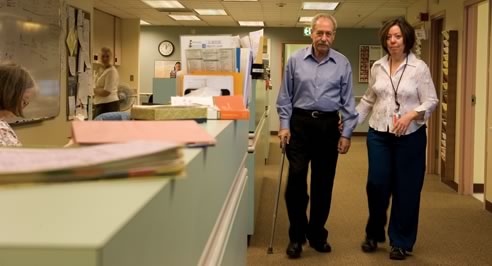Featured Initiative:

Click here for printable PDF
Care Transitions Model
 Starting when a patient is
scheduled to be discharged from
the hospital, the Care Transitions
Model helps older patients at
high risk for complications or
rehospitalization. The Transition
Coach, a specially trained nurse,
visits with the patient and their
caregivers over four weeks-
both in the hospital and at
home-and helps patients
learn to manage multiple
prescriptions, follow posthospital
recommendations, and
present their other health care
providers with the information
they need to be effective.
Over 100 hospitals and health
care systems had adopted the
model by 2007.
Starting when a patient is
scheduled to be discharged from
the hospital, the Care Transitions
Model helps older patients at
high risk for complications or
rehospitalization. The Transition
Coach, a specially trained nurse,
visits with the patient and their
caregivers over four weeks-
both in the hospital and at
home-and helps patients
learn to manage multiple
prescriptions, follow posthospital
recommendations, and
present their other health care
providers with the information
they need to be effective.
Over 100 hospitals and health
care systems had adopted the
model by 2007.
Improving Transitions Across Sites of Geriatric Care
To address the problems of uncoordinated and fragmented care around the period of hospitalization, the Foundation awarded the University of Colorado Health Sciences Center, Denver, Colorado, a five-year grant of $1,207,404 in 2000 to develop the Care Transitions Intervention. Dr. Eric Coleman served as principal investigator of this project. Dr. Coleman is a Robert Wood Johnson Clinical Scholar and a Beeson Scholar. He has served on the American Geriatrics Society health care systems committee and has worked with federal policy makers through convenings such as those of the National Health Policy Forum.
 Eric Coleman, MD, MPH
Eric Coleman, MD, MPH
Principal Investigator,
Care Transitions
University of Colorado
Older patients with serious or multiple chronic illnesses are at risk for suffering new health problems or worsening of their existing conditions following a hospital stay. For example, a patient with diabetes who has received confusing or possibly conflicting information about a change in his medication regimen while in the hospital may wind up with uncontrolled blood sugar levels.
Older patients with complicated health problems often see numerous
health care providers, a number that increases if treatment in a hospital
becomes necessary. The patient may be treated by a primary care
physician and various specialists in
their medical offices, a hospitalist
physician and nursing team in the hospital, a different physician and
nursing team during a stay in a skilled nursing facility, and a visiting
nurse in the home. Care can become fragmented when these providers
work independently of one another or, worse, at cross purposes.
Even when each health care provider delivers high quality care, the
result can be substandard care if their efforts are not coordinated.
"If you're selling umbrellas,
you have to figure out
how to make it rain.
We make it rain by
reshaping the health care
environment to embrace
these team care models."Eric Coleman, MD, MPH
Principal Investigator,
Care Transitions
Shorter hospital stays and inefficient systems for transferring medical
information from one health care site to another often place a burden on
patients and their families to navigate the complex health care system.
Yet patients and their families rarely receive adequate information and
preparation to manage and coordinate care after a hospital stay.
Lack of coordination on the part of health care providers and inadequate preparation of patients increases the risk for medication errors and health complications. This leads to avoidable readmissions to the hospital, leading to greater health care costs. National 30-day readmission rates among older Medicare beneficiaries range from 15 to 25 percent.12,13
Medication errors are of particular concern. A study by Dr. Eric Coleman and colleagues found that 14 percent of elderly patients admitted to the hospital experienced one or more discrepancies between their prehospital medication regimen, posthospital medication regimen, and what the patient reported actually taking.14 Factors involving patients, such as misunderstandings and other reasons for not complying with the regimen, contributed to about half of the medication errors. The other half of the errors were attributable to prescribers or the broader health care system. Medication discrepancies led to a greater number of hospital readmissions within 30 days.
Dr. Eric Coleman and his colleagues at the University of Colorado Health Sciences Center developed the Care Transitions Intervention team care model (www.caretransitions.org) to address these problems. The Care Transitions Intervention focuses on providing support and education for the patient and family caregiver. Interdisciplinary team care generally does not extend beyond the walls of a given institution. The only common thread moving across all sites of care is the patient and the caregiver, who become de facto care coordinators.
"We need to fix the broken health care system where providers don't
talk to each other," says Dr. Coleman. "But in the meantime, we need
to support patients and families in their self-management role."
Placing the older adult patient (and caregiver) at the center of the
interdisciplinary team in no way abdicates the responsibilities of the
health care professionals. This arrangement encourages greater
accountability for ensuring that the essential steps that need to take
place before and after transfer are executed.
Next: The Four Pillars of Care Transitions ›
12- Coleman EA, Min S, Chomiak A, Kramer
AM. Post-hospital care transitions: patterns,
complications, and risk identification. Health Serv
Res. 2004;39:1449-1465.
13- Centers for Medicare and Medicaid Services.
Medicare Quality Monitoring System. 2006.
http://www.cms.hhs.gov/QualityInitiatives
GenInfo/15_MQMS.asp.
14- Coleman EA, Smith JD, Raha D, Min S.
Posthospital medication discrepancies. Arch
Intern Med. 2005;165:1842-1847.
